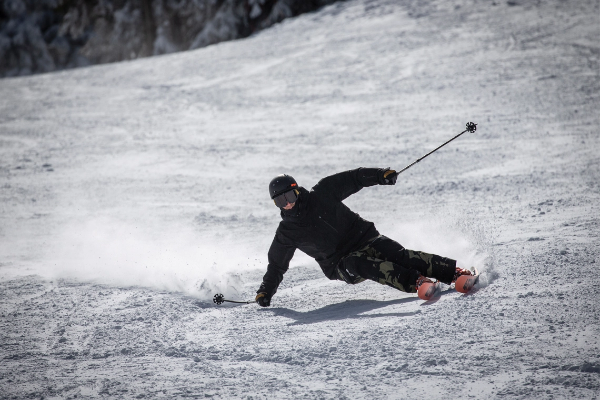All mountain skis are versatile. They are designed for various conditions. Whether on groomed trails or off-piste, these skis perform well. For both beginners and experts, all mountain skis are a popular choice.
What Are All Mountain Skis?
All mountain skis are multi-purpose. They can handle different types of terrain. These skis are wider than racing skis. This width provides better stability. The construction of all mountain skis is robust. This makes them durable and reliable.
Key Features of All Mountain Skis
Versatility
All mountain skis are adaptable. They work well on hard-packed snow. They are also effective in powder. This versatility makes them ideal for unpredictable conditions.
Width
These skis are wider than typical skis. This width helps in flotation. Flotation is crucial in powder snow. It keeps the skis from sinking.
Flexibility
All mountain skis have a balanced flex. This flexibility allows for easy turning. It also provides stability at higher speeds.
Different Uses of All Mountain Skis
Groomed Trails
On groomed trails, these skis offer stability. They allow for smooth, controlled turns. Beginners find them easier to handle.
Off-Piste Skiing
In off-piste conditions, these skis excel. The wider profile aids in deep snow. Advanced skiers enjoy the challenge of off-piste terrain.
Mixed Conditions
Weather can be unpredictable. All mountain skis are ready for anything. They perform well in mixed conditions. This includes icy patches and soft snow.
Ski Design and Technology
- Construction Materials: Overview of different materials used in ski construction (e.g., wood, metal, composites)
- Ski Shape: How the shape affects performance (e.g., waist width, tip and tail lengths)
- Rocker and Camber: Explanation of these terms and their impact on ski performance
- Bindings and Boots: Their role in overall ski performance and safety
Snow Conditions and Terrain
- Groomed Runs: Performance of all mountain skis on groomed trails
- Powder: How all mountain skis handle fresh snow
- Crud and Hard Pack: Navigating through variable snow conditions
- Steep Slopes and Moguls: Handling more challenging terrains
Skier Level and Preference
- Beginners: Advice on whether all mountain skis are suitable for beginners
- Intermediate Skiers: Maximizing fun and learning with all mountain skis
- Advanced Skiers: Using all mountain skis for advanced techniques and exploration
Comparison with Other Ski Types
- Carving Skis: Differences in performance and suitability
- Powder Skis: Why choose all mountain skis over powder-specific skis
- Park and Pipe Skis: Adapting all mountain skis for freestyle skiing
Buying Guide
- Length and Width: Importance in ski selection
- Flex and Stiffness: How it affects control and comfort
- Mounting Bindings: Correct positioning for optimal performance
- Fitting and Testing: Trying out skis before purchasing
Maintenance and Care
- Waxing and Tuning: Basic maintenance for skis
- Storage: Best practices for storing skis during off-season
- Safety Checks: Regular checks to ensure safe skiing
Advantages of All Mountain Skis
One Pair for All Conditions
Skiers do not need multiple pairs. One pair of all mountain skis is sufficient. This is cost-effective and convenient.
Ideal for Traveling
Traveling with multiple skis is cumbersome. All mountain skis simplify this. They reduce the need for excessive gear.
Choosing the Right All Mountain Skis
Skill Level
Beginners need skis that are forgiving. Advanced skiers prefer more responsive skis. Choosing the right ski depends on your skill level.
Ski Length
Length affects performance. Shorter skis are easier to turn. Longer skis offer more stability at high speeds.
Flex
The flex of a ski impacts control. Softer flex is better for beginners. Stiffer flex is suitable for experienced skiers.
Caring for All Mountain Skis
Regular Maintenance
Regular maintenance is essential. This includes waxing and edge sharpening. Proper care extends the life of your skis.
Storage
Store your skis in a cool, dry place. Avoid direct sunlight. Proper storage prevents damage.
See Also: The 10 Best Playful All Mountain Skis
Conclusion
All mountain skis are versatile and reliable. They cater to various skill levels. From groomed trails to off-piste adventures, they are an excellent choice. Investing in all mountain skis enhances your skiing experience. They offer the best of both worlds, making them a favorite among skiers.
FAQ: What Are All Mountain Skis Used For?
Q: What are all mountain skis?
A: All mountain skis are designed to perform well in a variety of snow conditions and terrain. They are versatile skis that can handle groomed runs, powder, and everything in between.
Q: What kind of skier is all mountain skis suitable for?
A: All mountain skis are suitable for intermediate to advanced skiers who want a ski that can handle a variety of conditions. They are also great for skiers who enjoy exploring the whole mountain.
Q: Can beginners use all mountain skis?
A: Beginners can use all mountain skis, but they may find them more challenging to control compared to skis specifically designed for beginners. It’s important for beginners to start with skis that are easy to maneuver and control.
Q: What kind of terrain can all mountain skis handle?
A: All mountain skis can handle a variety of terrain, including groomed runs, powder, crud, and even some steeper slopes. However, they may not be the best choice for extreme terrain or specialized conditions like deep powder or icy slopes.
Q: How do all mountain skis compare to other types of skis?
A: All mountain skis are more versatile than skis designed for specific conditions, like powder skis or carving skis. However, they may not perform as well in those specialized conditions as skis specifically designed for them.
Q: What should I look for when buying all mountain skis?
A: When buying all mountain skis, consider factors like length, width, shape, and flex. The right ski for you will depend on your skill level, body type, and preferred terrain. It’s always a good idea to consult with a ski expert or professional fitter to find the right ski for you.

